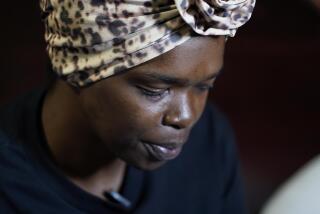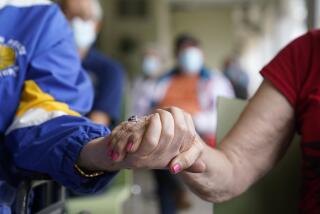Study Is Tracing Hardships of Katrina Survivors
BOSTON — Weariness, anxiety and pessimism are pervasive among survivors of Hurricane Katrina, according to preliminary findings of a study announced Thursday by Harvard Medical School.
Four months after the storm ravaged the Gulf Coast, “a lot of people are having trouble reconciling the extreme breadth of their loss,” said Anthony H. Speier, director of disaster mental health operations for the Louisiana Office of Mental Health and a collaborator on the study.
“Their homes are gone, their sense of community is gone, their sense of tradition is gone,” Speier said.
With names provided by the Federal Emergency Management Agency, the Red Cross and numerous other relief agencies, the investigation will monitor 1,000 people displaced by Hurricane Katrina from New Orleans and 1,000 people from other affected areas, including Mississippi and Alabama.
Rather than being survey subjects, the participants -- spread across the country and representing a spectrum of age, gender, race and socioeconomic status -- will be known as the Hurricane Katrina Community Advisory Group.
Their common experience is that they all had to leave their homes because of Katrina.
Dr. Ronald Kessler, a Harvard Medical School professor who is the lead investigator and architect of the survey, said Thursday that interviews with the survivors over a period of at least two years would provide information on the pace and dimensions of individual recovery. He said he hoped the data, focusing largely on the survivors’ mental health, would offer insights into how the 2 million families whose lives had been disrupted by the storm were faring.
Kessler characterized the undertaking as “giving people an opportunity to tell their story.” But he said the study would also provide information to help in future emergencies, allowing response experts to work toward what he called “the routinization of disaster” -- much as a hospital emergency room treated extraordinary health occurrences as everyday events.
Many of the questions will focus on government response to the storm, as well as attitudes toward agencies and officials, Kessler said. Along with issues such as degree of trust in government, “we are asking about satisfaction and lack of satisfaction with a wide range of organizations and entities,” he said.
The study also will explore subjective qualities such as whether individuals feel optimistic or pessimistic about their personal situations.
Starting in late February, the survey results will be made available to policymakers. The findings also will be posted on the study’s website, www.HurricaneKatrina.med.harvard.edu, along with oral histories from survivors.
Kessler said the participants would be interviewed by telephone at three-month intervals. He said the 100 interviewers who had been trained for the study would be observed to help prevent burnout.
Although the Community Advisory Group project will have its official launch Tuesday, a pilot sample has been underway since soon after the Aug. 29 hurricane, Speier said.
The early interviews suggest that anxiety among survivors is increasing, Speier said. One reason for the unease, he said, is that so many people do not know where they will settle.
Kessler said he expected to find different results among the survivors from New Orleans and those from other parts of the Gulf Coast. He noted that the hurricane experience was different for the two groups.
“New Orleans didn’t have a hurricane. New Orleans had a flood,” he said. “What happened in Mississippi and Alabama was an act of God. And what happened in New Orleans, in many people’s minds, was an act of bad bureaucracy.”
Thus, he said, “there is a potential bad guy for people to blame in New Orleans but not in Mississippi.”
The study is funded by a $1-million grant from the National Institute of Mental Health.
More to Read
Sign up for Essential California
The most important California stories and recommendations in your inbox every morning.
You may occasionally receive promotional content from the Los Angeles Times.










